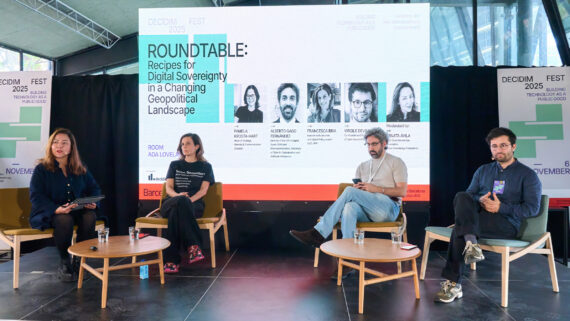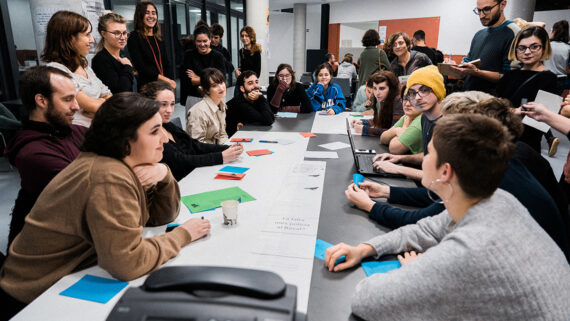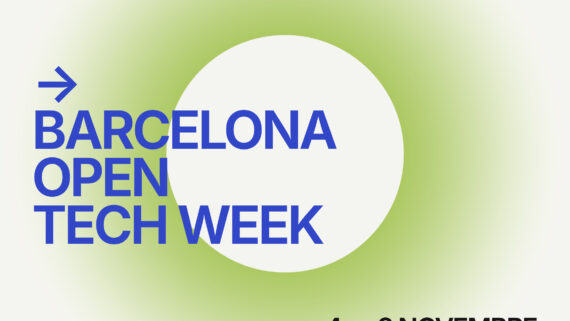On Friday, March 14, the Canòdrom – Ateneu of Digital and Democratic Innovation – and DigitalFems hosted a new edition of the 8M Canòdrom. For the fifth year in a row, the Gradas were filled with workshops, debates, and music, all with a clear goal: to move towards a fairer, more accessible, and more inclusive music and tech industry.
“8M Canòdrom is not just an annual event — it’s a commitment to rethinking the tools that keep this industry running and putting them in the hands of those historically left out. We see technology as a tool for change, not a barrier,” said Núria Alonso, coordinator of the Canòdrom, during the opening of the event.
The 8M Canòdrom 2025 kicked off with energy at the Gradas of the Canòdrom – Ateneu d’Innovació Digital i Democràtica, placing the spotlight on digital skills as a driving force for feminist transformation in the music and tech industries. It was just the beginning of a day that continued with collective debate and reflection, and culminated in live music to celebrate the talent and strength of women and gender-diverse creators.
Data that empowers music careers
With this transformative goal, the first part of the day focused on two digital skills workshops designed to provide practical and useful tools to women and gender-diverse people working in music. The training explored how strategic use of data and artificial intelligence can help grow projects with autonomy and critical insight.
The first workshop was led by Sarah Kloboves and Melina Raglin from the platform Chartmetric, a tool already used by more than 4,000 organizations in the global music industry. During the session, they explained how strategic data use can be key to professional growth in an increasingly globalized sector.
“Well-read data is power,” said Kloboves while showing how more than 10,000 different sources can provide precise insights into audiences, platform positioning, or artist trajectories. Raglin emphasized how such tools allow you to identify growth areas, analyze social media presence, or compare artists objectively.
The workshop included a hands-on platform exploration — from statistics visualization and metadata management to building comparisons between similar artist profiles. The session also highlighted the importance of critical data analysis as a tool for strategy and autonomy.
When artificial intelligence becomes an ally
Next, Majo Clutet, singer-songwriter, communicator, and commercial content analyst at Larrosa, led a workshop on artificial intelligence applied to music promotion. Clutet introduced the tool Wolfie IA, created to support independent artists, managers, and labels.
“AI can help us automate repetitive tasks, gain time for creativity, and reduce the burnout caused by self-management,” she explained. Beyond productivity, she emphasized AI’s potential to create targeted and data-driven promotional strategies, as well as its use as a self-care tool in a precarious industry.
The session included real examples of content generation, tour planning, pitch design, and AI-assisted promotional material creation. Clutet stressed that using these tools requires judgment: “It’s not just about generating text or images. You need to know how to talk to the machine — and then humanize the results.”
She also shared three keys to critical and ethical use of generative AI: knowing how to prompt clearly, edit and adapt generated content to your context, and identify possible biases in outputs. “AI is not neutral. We need to be trained to use it with our own critical and transformative lens.”
This first training block set the tone for a day committed to empowering creators through knowledge and putting technology at their service — a step toward more conscious, feminist, and inclusive digital music.
Metadata is not neutral
The following talk, led by Ivana Feldfeber from Data Género, addressed the political and social dimensions of data. “Metadata is the story behind the numbers. Knowing who collects the data, for what purpose, and from what perspective is essential if we want ethical analysis,” she stated.
Feldfeber stressed the need for an intersectional perspective on datasets and warned that what isn’t collected often leads to invisibility. “More data doesn’t mean more solutions. We need to ask the right questions and understand the context behind every dataset.”
She also introduced the three main types of metadata: descriptive (what’s in the dataset), usage (how it’s used), and historical (how and when it was created). “If we read side effects on a medicine label, why don’t we do the same with data?” she asked, quoting the Data Nutrition Project.
Manifesto for feminist metadata
During the following debate, the Gender Metadata Manifesto was launched, driven by DigitalFems through their Gimtech project. The document calls for recognition that data is not neutral and urges a rethinking of data governance based on justice, safety, and collective participation.
“The first step is recognizing that this data doesn’t fall from the sky. We generate it — so we must also have a say in how it’s used,” stated Thais Ruiz de Alda, founder of DigitalFems.
The future of feminist music: challenges and horizons
The panel “A Cybersyn to democratize digital culture”, moderated by Antònia Folguera (XRCB and Sónar+D), gathered voices from the music and tech scenes. Lara Alcázar (MIM) pointed out that only 13.7% of executive roles in the music industry are held by women, and that this underrepresentation shapes both production and distribution models.
Kissy Y. Perea (Roots Entertainment Agency) highlighted the need to embrace technology: “We’ve always been seen on stage, but we’re also producers, project managers, and strategists. AI can amplify our voices.” She also emphasized the sector’s precarity and the lack of recognition for women’s intellectual work.
Natalia SanJuan Betancourt (Femnøise) advocated for a genderless industry: “I don’t want anyone to be there just for a quota. I want a feminist, open, and plural music industry where all voices can contribute.”
Folguera closed the panel with a reflection on an often-overlooked issue: money. “It’s not just about visibility — we need fair wages too. Without resources to invest in our work, we’ll keep falling behind. That, too, is a power structure.”
Live music to inspire and make a statement
The event closed with two live performances that proved music can be both message and emotion. Fernanda Alemán & FTFS delivered a sonic journey of electronic sounds and Andean roots, while GIGI ROS offered a powerful set of experimental pop, blending music, visuals, movement, and style.
With this fifth edition, 8M Canòdrom is consolidated as a key space in the city to rethink the present and build future possibilities. A day to learn, connect, and advocate for a music and tech industry that is feminist — because transforming the industry starts with transforming its tools.







